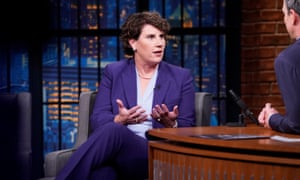Charles Booker is less of a long shot to beat Amy McGrath, a centrist former air force pilot, as the Democrats’ pick for a Kentucky Senate seat after weeks of anti-racist protests

Photograph: Bryan Woolston/AP
Amy McGrath’s nomination was supposed to be a done deal.
In the 24 hours after she announced her candidacy last July, the former marine fighter pilot raised $2.5m, a record for a Democratic Senate candidate. She had name recognition from a failed 2018 congressional bid and became more familiar soon when she was hosted on late-night comedy shows, held up as the person who could finally unseat the Senate majority leader – and liberal bete noire – Mitch McConnell.
McGrath had said some things that appeared to show an openness towards Donald Trump, but there are those in deep-red Kentucky – where Trump won by 30 points in 2016 – who would say the only way a Democrat can win a statewide race is by being a centrist and wooing Trump voters.
She was endorsed by the Democratic Senate Campaign Committee and as of the end of March she had roughly 200 times the amount of cash on hand as each of her two progressive, grassroots challengers did. It looked like it was in the bag.
Her closest challenger, seen as a distant long shot, was Charles Booker, a progressive 35-year-old African American rookie state representative from Louisville’s predominantly black West End who advocates for things like universal basic income, the green new deal and, now, reimagining law enforcement and cutting back police funding.
But in late May, mass protests erupted in Louisville over the police killing of Breonna Taylor here in March. Booker began showing up at the protests, standing out in his suit in crowds that were dressed for the heat and expecting confrontations with riot cops, and even got teargassed alongside protesters.
“When this moment happened with Breonna Taylor, I knew where I needed to be at,” he told the Guardian in an interview. “People were grieving, mourning in the streets in real time … And my response to that was to be there with them.”

The things Booker had been speaking about – how difficult it is living in the neglected parts of the city and the state – started to resonate with a broader audience. His popularity and name recognition have grown quickly. Suddenly, like a handful of other insurgent candidates around the US, the protests were lifting up politicians who could channel their energy, cause and passion.
“When you have an event that’s all anybody can talk about and you have a candidate that seems omnipresent within that event, it can’t not change the dynamics of the race,” said Matt Erwin, a Democratic strategist in the state.
Others agree. “I think early on I would say it was not going to be competitive, that McGrath was going to be the nominee,” said Anne Cizmar, a professor of government at Eastern Kentucky University. “But I think now Booker is a competitive candidate to potentially win the nomination.”
There is little polling data available, but last week alone, Booker secured endorsements from Bernie Sanders, Alexandria Ocasio-Cortez and Kentucky’s two biggest newspapers. And in an eight-day span earlier this month, he raised nearly triple the amount of money was able to in the first three months of 2020.
To Booker, the issues he talks about are personal. He’s black. He’s from the poorest part of Louisville and the state. He’s a type 1 diabetic who says he’s had to ration insulin to put food on the table for his family.
His cousin – who was murdered in Louisville four years ago – was a good friend of Breonna Taylor, the 26-year-old ER tech whose death sparked protests here. On 1 June, a national guard soldier shot and killed David McAtee – known as YaYa or “the barbecue man” – as troops and cops tried to clear a crowd that was violating curfew. McAtee’s barbecue stand is just blocks from Booker’s home and a place he knew well.
He told the Guardian that when he was in college, a cop once pulled him over in his neighborhood for making a rolling stop and approached his vehicle with a gun out. These days, as he drives to the state’s capital, he says he regularly passes young men his age lying on the ground, surrounded by police.
“Just seeing it, just it being a regular part of how we’re treated, has definitely left a mark on me and helps me see why we need to completely reimagine public safety,” he says of his encounters with law enforcement.
He added that institutional and structural racism need to be addressed so that members of poor communities and communities of color “are not treated like a deadly weapon before being treated like a human being”.

McGrath is a sharp contrast to Booker.
She talks about making healthcare and education cheaper, but not free. She touts the fact that her husband is a Republican and that she is a gun owner. At the race’s sole debate, held the same day Trump delivered a speech in which he called on governors to “dominate the streets” and threatened to use the military to quell protests, McGrath again spoke of how she’d be willing to work with Trump on some issues if he was re-elected.
“I think that’s what people want,” she said. “Wouldn’t you want that in a senator?”
She said would also stand up to the president when it’s right for Kentucky.
How much of a chance Booker has is still debated.
“I think he has a shot, but it’s a really long shot, to be quite honest with you,” said Dewey Clayton, a political science professor at the University of Louisville. Booker has momentum, he added “but we’re in June now, I don’t know if it’s going to be enough time before the primary for him to make up what he lacks as far as exposure and getting the message out there.”
On Saturday, Booker’s campaign released internal polling data – the only polling data made public for this race to date – that showed McGrath leading him by 10 points. Among those who hadn’t yet voted, however, her lead was down to seven points.
Regardless of who wins the primary, beating McConnell in November is seen as a difficult venture.
A poll last week showed McGrath up on McConnell 41% to 40% while a May poll between McConnell and a generic Democratic candidate had the senator leading by three points.
But despite McConnell’s continuing unpopularity and the close poll numbers, experts remain cautious.
Clayton, the University of Louisville, professor, said he expects McConnell to win in November, adding that him being one of the most powerful men in the country “gives a lot of Kentuckians a sense of pride, whether they agree with him or not”.
Erwin, the Democratic strategist, was more optimistic about voting McConnell out.
“I think any Democrat has a fighting chance against the least popular senator in America,” he said.




